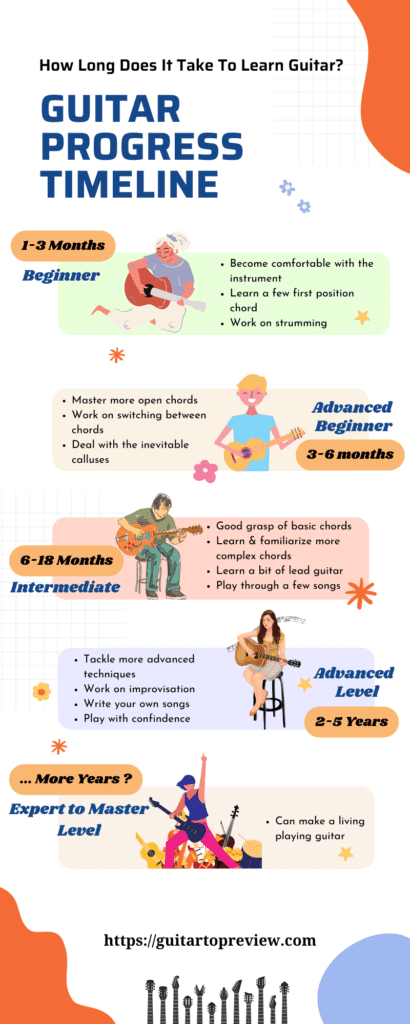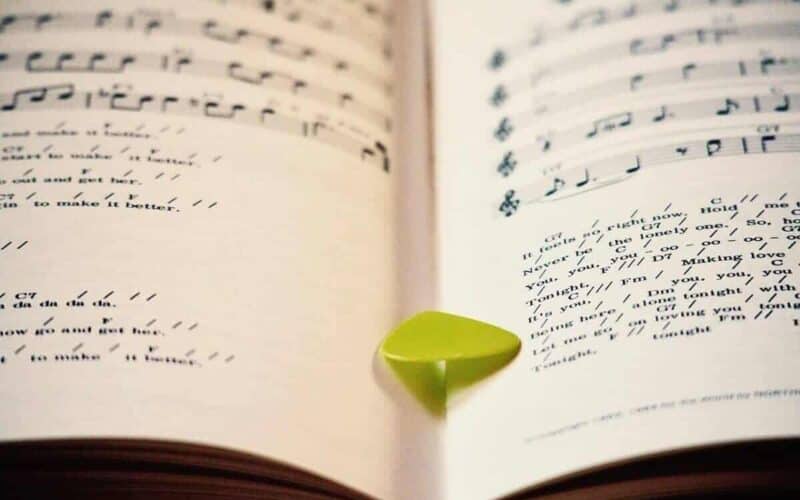When you play guitar publicly for long enough, you’ll inevitably hear many of the same comments and questions. “I’ve always wanted to learn guitar,” someone will say, a wistful, almost regretful look in their eyes. More often than not, the follow-up to this question is, “How long does it take to learn the guitar?”
I never mind when someone asks; it usually means they’re looking for some information and perhaps some encouragement regarding something they’ve thought about before. I’m always quick to point out that to get a satisfying answer, they’ll have to make the question a bit more specific.
How Long Does It Take To Learn Guitar?
The main problem with the question is what, exactly, is meant by “learn the guitar.” The kid who’s learned enough chords to play in his church folk band or entertain relatives during the holiday season has “learned guitar.” So has Joe Bonamassa. You see where I’m going here.
Once we’ve defined our terms, we can set some goals, then make rough, though reasonably accurate predictions concerning how long it will take to learn guitar for a given student.
Guitar Learning Timeline

To give you a better idea of how long it will take to learn guitar, and also some goals to shoot for, consider the following acoustic or electric guitar learning timeline based on an average of one-to-two hours of practice per week:
A Student’s First Three Months
How long it takes to learn guitar depends primarily on how much practice a student is willing and able to put in every day.
Generally speaking, the first three months of learning guitar will consist of becoming comfortable with the instrument, learning a few first-position basic chords, and working on strumming. A student can make real progress during these first ninety or so days, though they aren’t likely to feel they’ve progressed very far at all.
Tackling the basics is what separates the future guitarists from those who find they aren’t as jazzed as they thought they were at the prospect of playing guitar.
The students who do stick it out, diligently learning chords like E minor, A minor, A, E, and G, will be rewarded as they progress to the next level. Here, at three to six months, is where the real fun begins.
Three-To-Six Months
The three-to-six month period in a guitarist’s development should be spent mastering the chords already learned, working on switching between them, and dealing with the inevitable calluses that have developed on their fingertips.
They’ll also progress to learning more open-position chords like the C and D. This, as most budding guitarists discover, represents the opening of a door into a new world of musical possibility.
An incalculable number of hits songs rely on the G, C, and D frameworks. Whether a student is a fan of country, pop, or rock, a guitar student will be able to find songs, often by their favorite artists, that rely solely on the chords they’ve learned up to this point.
Now, students who are serious about the guitar will likely find themselves putting in more than the recommended time for practice.
Six-To-Eighteen Months
Once a student has been practicing for six months, they’ll likely feel much more comfortable with the guitar. By this point, the student should be building a good callus on each fingertip, and stretching to finger chords should come more naturally.
The student guitarist is off and running now, so to speak. They’ll likely have a good grasp of the basic chords and be able to play through a few songs at the very least. The student will probably feel comfortable playing with other guitarists or singers.
If they haven’t already of their own initiative, the student should learn and familiarize themselves with some of the more complex basic open chords. F, Bm, and Dm should be a part of every student player’s repertoire by the six-to-eight month mark. The faster a student masters the basics, the less time it will take to learn guitar.
After a student feels they have a good grasp on the basic first-position (or open-position) chords, it’s only natural they’ll want to progress to learning a bit of lead guitar.
The six-to-eighteen month period is a good time for the budding guitar player to take their first steps into this area, and learning simple guitar fills is an excellent way to begin.
Two-To-Five Years
Like the three-to-six-month period, the two-year mark can be something of a watershed moment for practicing guitarists. If they haven’t already, it is time for the student to tackle barre chords and more advanced techniques.
In much the same way learning the G, C, and D chords opens doors for the learning guitarist; mastering barre chords lay bare to the student the entire neck of the guitar. Once a student learns bar chords, they’ll be able to play any chord.
By this point, guitarists inclined to write their own songs will probably have begun to do so. Not every guitarist is a songwriter, and that’s fine. Mastering bar chords opens new vistas to the aspiring songwriting guitarist like perhaps nothing else.
5 Years +
With more than five years of guitar playing under your belt, playing the guitar becomes more of a 2nd nature to you and there’s no doubt that you have mastered how to play it. You can easily play any song thrown your way, regardless of how complicated it may be.
But, that shouldn’t stop you from further improving your skills. Continue to practice and play the guitar daily, and you’ll surely be surprised by how much you can still improve.
Of course, it can take you more time to reach your goal. Those who want to take a career path playing the guitar or join a band may spend a lot more years improving their skills.
It would greatly help if you learned the theory of scales during your learning journey and understand how chords are constructed.
Guitar Progress Timeline [Infographic]

Tips For Faster Guitar Learning Progression
No matter how much you enjoy playing, you’re bound to face moments of discouragement when you learn to play guitar. How fast can you learn guitar or how long you take to learn guitar depends, to some extent, on keeping discouragement at bay.
Some things you won’t pick up on as quickly as others, and some things your hands simply won’t be trained for yet. It’s also important to remember that everyone progresses at their own pace and that comparing yourself to the guitarist you were yesterday is always better than to someone else.
It is possible to increase the rate you learn guitar by increasing the hours you spend practicing. Really, this is the only accurate measure of where your skill level should be, roughly speaking. Always count your guitar time in hours, not weeks, days, months, or years.

Increasing your practice time and spending it productively makes it possible to pack the above-mentioned two-year plan into about six months. Keep in mind this is a rough estimate, depending entirely on how quickly you want to learn and how much time you’re willing to invest.
Every practice session should feel like an investment in your skills and every practice session should result in improvements to your guitar skills. If you can’t see any signs of improvement after six months of practice, try incorporating a guitar teacher into your schedule for a week or two to see if you can quickly pick things up again.
If the above strategies seem like too much work, remember that every little bit counts and all practice sessions can be your biggest boost to skills and enthusiasm possible. If you really want to improve your knowledge of the guitar, spend as much time as you can practicing every day without fail.
Frequently Asked Questions
How Long Does It Take To Learn A Song On Guitar?
Like asking how long it takes to learn to play the guitar, asking how long it takes to learn to play songs depends on several variables. How long a guitarist has been practicing, their skill level and the song in question must be considered when estimating an answer to this question.
A beginner guitarist who’s been playing for one-to-three months can expect to be able to play simple, two-or-three-chord songs. That’s not to say they’ll be able to play them perfectly; learning your first chords is easier than learning to change between them.
For intermediate guitarists, how long it takes to learn a song depends primarily on the song being learned. If the song is in a style the guitarist is accustomed to, and learning it doesn’t require acquiring any new skills, one to three days is all it should take to learn a new song, solos, fills, and all.
What Is The First Thing To Learn On Guitar?
Ask ten different guitarists, and you’ll likely get ten different opinions as to the first thing students should learn when beginning to play guitar.
Learning to tune the guitar is essential, as is learning how to finger a note. Learning to care for your guitar is also important; you aren’t going to want to run to the local music store every time you break a string.
While honest guitarists can argue about what is the first thing a new student should learn on guitar, I believe it all begins with holding the instrument properly.
Without mastering this often-overlooked fundamental, many guitar students unwittingly sabotage their progress. Injury to the wrist or back is also possible. When asking, “how long does it take to play guitar?” you don’t want to have to consider injury.
Can I Learn Guitar In Three Months?
Once again, to answer this question we have to define our terms, specifically, what one means by “learn guitar.”
After six months of diligent practice, most guitarists will have familiarized themselves with the open-position G, C, and D chords and will be able to switch between them with a fair degree of smoothness.
In this sense, one could say this student has “learned guitar” in three months. The statement is fair, as there are many more people who can’t play even this much guitar than who can.
In a broader sense, learning the guitar is very much like learning a second language. You can learn enough to get your point across rather quickly. Mastery of the language will take a lifetime, and there are always more subtleties than anyone can learn.
And like language, guitar-playing is a fluid, ever-developing field. Just when a guitarist masters one technique, an innovative player somewhere else is inventing or fine-tuning a new one. For this reason, the question of how long it takes to master a guitar is inappropriate, as guitar mastery is a lifelong endeavor.
How Quickly Can You Learn Guitar?
Ultimately, how quickly you can learn to play guitar depends on how much you love playing and how much time you’re willing and able to invest in structured practice.
As mentioned earlier, it isn’t about how many years you’ve been practicing but how many hours per day you put in during those years.
Can I learn guitar from YouTube?
Yes, You can learn guitar from YouTube. Since YouTube is a video-sharing platform that contains thousands of informative videos about guitar playing. By browsing through its content library, you will find various guitar lesson channels – and that allows you to pick the one whom you’re most comfortable learning guitar from.
Check out a Guitar Tutor’s view on how long does it take to get good at guitar:


